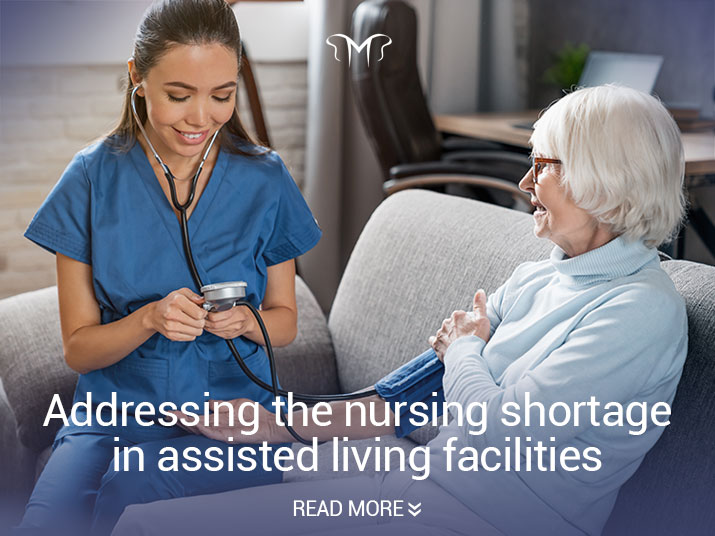
Addressing the Nursing Shortage in Assisted Living Facilities
The nursing shortage in assisted-living facilities is one of those complex issues that need a close examination. These living facilities are vital for disabled individuals who need help with their daily activities. Throughout the section, we will examine the factors contributing to the nursing shortage and its impact on resident care.
Factors Contributing to the Nursing Shortage and its Impacts
The most important factor is the shortage of nurses in Germany’s healthcare system. This is in part due to an aging population but also tighter competition among the nurses.
Among the other factors, we can point to inadequate staffing and burnout. This high rate of nurse shortage has a direct effect on the quality of resident care.
When you don’t have enough nurses, it means less one-on-one care and more workload for the staff; which leads to burnout. Additionally, it reduces the opportunities for preventive care and decreases the monitoring of residence conditions.
Strategies to Address the Nursing Shortage
Remember just a couple of sentences ago when we talked about the effects of nursing shortage in assisted facilities? Well, to address it, we need thought-out strategies that help us attract nurses. Let’s check out some of the strategies we keep talking about.
Targeted Recruitment Campaigns
One of the effective methods for addressing such a challenge is doing recruitment campaigns and partnering up with nursing schools and healthcare organizations. This engagement can lead to more potential candidates being exposed to the opportunity.
Said “opportunity” can be job fairs, social media outreach, or even simple online advertising.
The government can also collaborate with nursing schools to help them connect with nursing graduates or students. Offering them internships or mentoring will also help.
Better Compensation Packages and More Benefits
These are perhaps some of the best things you could do to address the nursing shortage in living facilities. Your compensation packages must at least be on par with the industry’s norm, if not higher. Keep in mind that you should still take into account the candidate’s experience, knowledge, and training.
Since your need for attracting nurses is urgent, you must also provide more benefits than others. These benefits could be anything from flexible working hours to lucrative retirement plans. These benefits are more than just a good gesture. They show the nurse that you value their contributions to the team.
Implementing Retention Strategies for Nurses
Retaining the nursing staff is just as important as attracting them, if not more. By retaining your nursing staff, you can better address the nursing shortage in assisted living facilities in the long run.
A tried-and-true method for increasing retention is developing a positive work environment and valuing open communication and professional growth. By encouraging professional growth, you’re allowing the nurses to take time to expand their knowledge and become better at what they do.
Setting bonuses for above-average performance can also lead to a higher retention rate because well, who hates more money? You’ll want to give your staff regular performance evaluations too, since it improves job satisfaction in most people.

The Importance of Training and Education for Nurses in Assisted Living Facilities
Assisted living facilities take care of different people, including those who have health problems related to aging or complicated medical conditions. Nurses who work in these places receive special training to learn about how to care for older adults.
This training covers important topics like managing long-term health issues, helping residents move around and be independent, giving medicine safely, and supporting their emotional and mental well-being. When nurses gain knowledge and skills in geriatric care, they become better at providing individualized and caring support to the residents.
Healthcare practices and industry standards continuously evolve, which makes it highly important for nurses in assisted living facilities to never stop getting educated.
Continuing education programs and professional development opportunities enable nurses to stay abreast of the latest research, evidence-based practices, and advancements in geriatric care.
Through continuous education, nurses will get the up-to-date knowledge and skills required to provide high-quality care. By remaining current in the field, nurses can offer residents the best possible care and contribute to the patients’ overall health.
You can learn more by reading career advancement opportunities for nurses article.

Using Technology for Efficient Nursing Care in Assisted Living Facilities
Technology has proved to be a most valuable tool in healthcare just as it has in other fields. If instead of resisting change, we embrace the integration of modern technology in our assisted living facilities, the efficiency of the care and patients’ general health will improve drastically. Let’s see how technology can be used to address the nursing shortage in assisted living facilities.
There are 3 specific areas that we think technology would be most useful: Electronic Health Records (EHRs), telehealth services, and utilizing assistive technologies for increasing safety and communication.
The first item — electronic health records — makes it easier for nurses to keep track of residents' health information. It also helps them document things accurately and provide comprehensive care. Nurses can use EHRs to quickly find and update residents' medical histories and medication lists.
Additionally, EHRs reduce mistakes and allow nurses to use up-to-date information to provide personalized care. Assisted living facilities can benefit from EHRs by improving their nursing processes, making care safer, and more effective for residents.
The second item, Telehealth services. They have made significant changes to how healthcare is provided and can surely help address the nursing shortage in assisted living facilities. Nurses can use Telehealth services to monitor residents' health remotely, conduct virtual check-ins, and communicate with the residents’ families.
By using this technology, nurses will be able to respond quickly, detect health issues early on, and reduce time wasted on unnecessary visits to the hospital. By using telehealth services, assisted living facilities can expand their healthcare support beyond their physical location.
Last but not least, is assistive technologies. They are important if you want to keep residents safe and help them communicate in the facility. Assistive technologies include devices such as fall detection systems, wearable health monitors, and communication tools.
Fall detection systems are equipped with sensors that alert nurses when someone falls, so they can quickly come to help and prevent serious injuries.
Wearable health monitors keep track of residents' vital signs, sleep patterns, and activity levels. This information is used to assess residents' health.
Communication aids, like video calling devices, make it easier for residents to contact nurses. By using these assistive technologies, assisted living facilities can ensure their residents’ safety, improve communication, and provide better nursing care overall.
Hiring a Registered Nurse for a Disabled Family Member’s Home Care
When it comes to taking care of a disabled family member, you must take into account their unique needs. These needs include their cognitive, physical, and emotional needs. If you understand these needs, you can help the nurse understand them as well and provide the best care.
One way you can use to find a registered nurse for home care is to use trusted home care agencies. These agencies match caregivers that are best at dealing with the specific needs of patients, including patients with disabilities.
These agencies usually have a group of registered nurses who can take care of your disabled family member better than anyone else. By consulting with these agencies and using their services, you can be sure that your family member will receive the best professional care.
The next step is to check their qualifications and experience. You must make sure they have the right skill set and training in taking care of people with disabilities. They must also have prior experience in working with patients whose condition is similar to your family member’s.
After you’ve thoroughly looked into their experience, you must make a decision on whether or not they’re a good fit for your disabled family member.

Conclusion
The nursing shortage in assisted living facilities is becoming a bigger problem by the day. Not only is it hard to give proper care to disabled people now, it’s even harder to even find a nurse. The healthcare system must use strategies such as special training, integrating technology, and providing more benefits to successfully address the nursing shortage in assisted living facilities.
FAQ
Are background checks done on nurses who work at assisted living facilities?
Yes. As a means to ensure the safety of its residents, almost all facilities conduct background checks on their staff.
Can nurses in medical facilities perform medical procedures?
Yes and no. They absolutely can perform medical procedures as long as they’re within the scope of the facility’s policies.
Are nurses available 24/7 in assisted living facilities?
Usually yes. Although it varies between facilities, most assisted living facilities have staff on-call 24/7.


